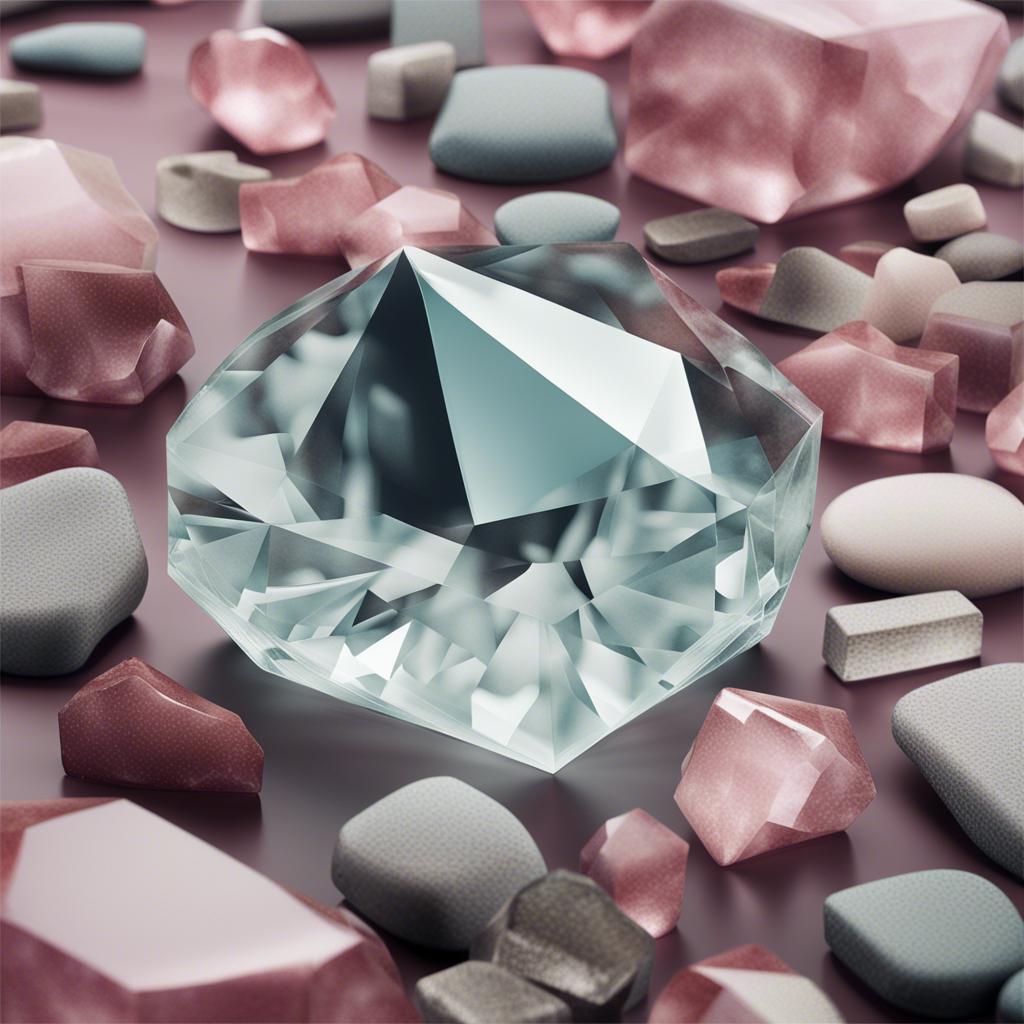
8
Apr
How Much is Quartz Worth: Discover its Value and Benefits
Quartz is a commonly found mineral that can be used in a variety of industries, from jewelry making to electronics manufacturing. But how much is quartz actually worth? In this article, we’ll delve into the factors that determine the value of quartz, from its inherent properties to market demands. Whether you’re a collector, a seller, or just curious, understanding the worth of quartz can provide valuable insights into its role in the global economy.
Table of Contents
- What Affects the Value of Quartz
- Determining the Quality of Quartz
- Factors Influencing the Price of Quartz
- Estimating the Market Value of Quartz
- The Role of Clarity in Quartz Pricing
- Understanding the Rarity of Quartz
- How to Assess the Worth of Your Quartz Collection
- Q&A
- Future Outlook
What Affects the Value of Quartz
Quartz is a highly sought-after mineral that holds significant value in various industries, including jewelry, construction, and electronics. Several factors influence the value of quartz, making it essential to understand what affects its worth.
1. Rarity: The rarity of a particular type of quartz significantly impacts its value. For example, amethyst and citrine are considered semi-precious gemstones and are relatively common, thus commanding a lower price compared to rarer varieties such as rose quartz or smoky quartz.
2. Clarity and Color: The clarity and color of quartz also play a crucial role in determining its value. Clear, colorless quartz is the most common variety and is generally more affordable. On the other hand, quartz with vibrant colors such as amethyst, citrine, or rose quartz is highly prized and commands higher prices, especially if the color is deep and evenly distributed.
3. Cut and Carat: The cut and carat weight of a quartz gemstone significantly influence its value. Well-cut quartz with an optimal carat weight tends to be more valuable due to its aesthetic appeal and overall size.
Determining the Quality of Quartz
When determining the quality of quartz, there are several factors to consider. One of the primary indicators of quartz quality is its clarity. High-quality quartz is typically free of visible impurities and inclusions, which can affect its overall appearance and value. The color consistency of quartz is also crucial in determining its quality. Uniform color distribution throughout the quartz slab indicates a higher quality, while variations in color can lower its value. In addition, the durability of quartz is an essential factor in assessing its worth. Quartz that is resistant to scratches, stains, and heat is considered to be of higher quality.
Another aspect to consider when evaluating the worth of quartz is its origin and brand. While natural quartz from reputable sources tends to command higher prices, engineered quartz from well-known manufacturers can also hold significant value. The overall craftsmanship and finish of the quartz slab also play a role in determining its quality and worth. Smooth edges, precise cuts, and a polished surface indicate attention to detail and superior quality.
Ultimately, the worth of quartz is determined by a combination of these factors, as well as market demand and current trends. By considering clarity, color consistency, durability, origin, and craftsmanship, individuals can make informed decisions when investing in or selling quartz surfaces.
Factors Influencing the Price of Quartz
When it comes to determining the value of quartz, several factors come into play, influencing its price in the market. Understanding these factors can help you make an informed decision when buying or selling quartz. Here are the key factors that influence the price of quartz:
- Rarity: The rarity of a particular type of quartz greatly impacts its price. Rare varieties such as ametrine, rutilated quartz, and fire quartz command higher prices due to their scarcity in the market.
- Color: The color of quartz also plays a significant role in determining its value. For example, vibrant and saturated colors like deep purple in amethyst or vivid golden hues in citrine are highly sought after and, therefore, more expensive.
- Clarity: The clarity of quartz, measured by the absence of inclusions or blemishes, can greatly affect its price. High clarity quartz is more valuable and often commands a premium in the market.
- Size: The size of the quartz crystal or specimen can also influence its price. Larger, well-formed crystals are generally more valuable than smaller ones due to their rarity and aesthetic appeal.
Other factors such as the cut, origin, and market demand also play a role in determining the price of quartz. By considering these factors, you can gain a better understanding of how quartz is valued and make informed decisions when buying or selling quartz.
Estimating the Market Value of Quartz
Quartz is a popular mineral that is used in a wide range of industries, including jewelry making, electronics, and construction. can be a complex process, as it is influenced by various factors such as quality, rarity, and demand. Here, we will discuss the key factors to consider when determining the worth of quartz.
Quality: The quality of quartz plays a significant role in determining its market value. High-quality quartz with clarity, color, and luster will fetch a higher price compared to lower quality specimens. Gem-grade quartz, such as amethyst and citrine, are highly sought after and can command a premium price in the market.
Rarity: The rarity of quartz varieties also impacts their market value. For example, rare varieties of quartz such as rutilated quartz, strawberry quartz, and fire quartz are valued higher due to their scarcity in nature. This makes them more desirable to collectors and enthusiasts, leading to a higher market price.
The Role of Clarity in Quartz Pricing
When it comes to understanding the pricing of quartz, clarity plays a pivotal role. Clarity refers to the transparency and clearness of the quartz crystal, and it significantly impacts the overall value of the stone. In the world of gemstones, clarity is often used as a measure of quality, as it indicates the presence or absence of any internal flaws or imperfections within the stone. Therefore, the clearer the quartz, the higher its value.
Factors Affecting Quartz Clarity and Pricing
- Natural Inclusions: Quartz with minimal natural inclusions or imperfections usually commands a higher price due to its rarity and desirability.
- Artificial Enhancements: Some quartz crystals undergo treatments to improve their clarity, which can affect their pricing. Treated quartz may be more affordable but can lack the value and authenticity of natural, clear specimens.
- Size and Shape: Larger, well-shaped quartz crystals with exceptional clarity are highly sought after and carry a premium price tag compared to smaller or irregularly shaped specimens.
- Rarity: The scarcity of high-clarity quartz varieties, such as flawless rock crystal quartz, contributes to their higher pricing in the market.
| Clarity Grade | Price Range (per carat) |
| Flawless | $500 – $1000 |
| Eye-Clean | $200 – $500 |
| Included | $50 - $200 |
In conclusion, clarity is a critical determinant of quartz pricing, and it can vary significantly based on the factors mentioned above. Whether you are a collector, jeweler, or consumer, understanding can help you make informed decisions and appreciate the value of this mesmerizing gemstone.
Understanding the Rarity of Quartz
Quartz is a mineral that is both abundant and yet incredibly rare when it comes to high-quality, gemstone-grade specimens. The sheer variety of colors and formations of quartz, coupled with its unique light-reflective properties, make it a highly sought-after material in jewelry and crystal healing. However, truly valuable and unique quartz specimens are exceptionally rare, with certain types commanding prices that rival those of other precious gemstones.
What makes certain quartz specimens so valuable is not just their scarcity, but also their exceptional clarity, color, and growth patterns. For instance, amethyst and citrine quartz gemstones that are completely natural and free of inclusions or color treatments are considered extremely rare and valuable. Similarly, rutilated quartz with well-defined and intricate golden needle-like inclusions is highly prized by collectors and jewelry enthusiasts.
How to Assess the Worth of Your Quartz Collection
When it comes to assessing the worth of your quartz collection, there are several factors to consider. The value of quartz can vary depending on its quality, color, size, and rarity. Here are some key points to keep in mind when evaluating the worth of your quartz specimens:
- Quality: The quality of the quartz specimen is a crucial determinant of its worth. High-quality quartz will have clarity, translucence, and a lack of visible flaws or inclusions. Poor-quality quartz, on the other hand, may be cloudy, opaque, or riddled with imperfections.
- Color: The color of quartz can also impact its value. Clear or white quartz is generally more common and affordable, while colored varieties such as amethyst, citrine, or rose quartz may fetch a higher price, especially if the color is vibrant and evenly distributed.
- Size: The size of a quartz specimen can influence its worth to a certain extent. Larger specimens are often more desirable and can command higher prices, particularly if they exhibit exceptional clarity and color.
- Rarity: Rare types of quartz, such as rutilated quartz or fire quartz, are typically more valuable than common varieties due to their scarcity and unique visual appeal.
Additionally, the market demand for certain types of quartz at any given time can also affect their value. It’s essential to stay informed about current trends and preferences within the quartz collecting community to accurately gauge the worth of your collection. If you’re unsure about the value of your quartz specimens, consider seeking a professional appraisal to get a precise assessment.
Q&A
Q: What exactly is quartz and why is it valuable?
A: Quartz is a common mineral composed of silicon and oxygen atoms. It is valuable due to its wide range of uses in industries such as electronics, jewelry, and construction.
Q: How is the value of quartz determined?
A: The value of quartz is determined by various factors including its quality, clarity, color, and size. Demand and market conditions also play a significant role in determining the value of quartz.
Q: What are the different types of quartz and do they vary in value?
A: There are several types of quartz such as amethyst, citrine, and rose quartz. Each type varies in value based on its rarity, color, and quality.
Q: Is natural quartz more valuable than synthetic quartz?
A: Natural quartz is generally more valuable than synthetic quartz due to its rarity and unique characteristics. However, the value of synthetic quartz can still be significant depending on its quality and intended use.
Q: How much is quartz worth on average?
A: The value of quartz can vary greatly depending on the factors mentioned earlier. On average, high-quality quartz can be worth anywhere from a few dollars to several hundred dollars per carat.
Q: Are there any famous or particularly valuable pieces of quartz?
A: Yes, there are several famous and valuable pieces of quartz such as the ”Devil’s Head” quartz crystal, which is valued at over $50,000 due to its unique formation and size.
Q: What should someone consider when buying or selling quartz?
A: When buying or selling quartz, it’s important to consider factors such as the quality, rarity, and market demand. Additionally, obtaining a proper appraisal or certification can ensure a fair transaction.
Future Outlook
In conclusion, the value of quartz is determined by various factors such as quality, color, and rarity. Whether you’re a collector, a jeweler, or simply someone with an interest in rocks and minerals, understanding the value of quartz can be both fascinating and practical. From its use in technology to its beauty in jewelry, the worth of quartz goes far beyond its monetary value. We hope this article has shed some light on the intriguing world of quartz and its worth. Thank you for reading!









